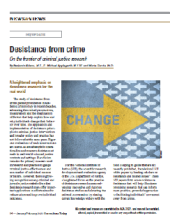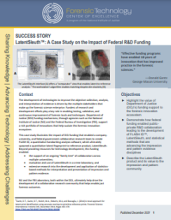Research
National Institute of Justice: Public Labs Research Solicitation
Results of a Type 2 Translational Research Trial to Prevent Adolescent Drug Use and Delinquency
Introducing the Forensic Research/Reference on Genetics Knowledge Base FROG-kb
Controlled GPR Grave Research: Comparison of Reflection Profiles Between 500 and 250 MHz antennae
Potential carcass enrichment of the University of Tennessee Anthropology Research Facility: A baseline survey of edaphic features
Emerging Trends in Psychology and Law Research
Fluid dynamics topics in bloodstain pattern analysis: comparative review and research opportunities
Research Methods in Human Skeletal Biology
Cognitive Behavioral Theory, Young Adults, and Community Corrections: Pathways for Innovation
Adolescent Relationship Aggression Perpetration and Victimization in the Context of Neighborhood Gender Equality
Situational Deterrence and Claim Padding: Results From a Randomized Field Experiment
Opportunity, Group Structure, Temporal Patterns, and Successful Outcomes of Far-Right Terrorism Incidents in the United States
Reentering Women: The Impact of Social Ties on Long-Term Recidivism
Crime and Justice: A Review of Research, Volume 28
Desistance from Crime: On the Frontier of Criminal Justice Research
Booker and Beyond Analyzing Sentencing Reform and Exploring New Research Directions
This webinar features a discussion of previously published research on the U.S. Supreme Court’s 2005 Booker decision - which effectively transformed the United States Sentencing Guidelines from a mandatory, to an advisory, system. The presentation will address selected research findings from the last 15 years. Individual participants will briefly review their previous research findings with particular attention paid to the analytic methods used.
See the YouTube Terms of Service and Google Privacy Policy
How Things Burn: Developing Realistic Models of How Materials Combust and Degrade in a Fire
NIJ Announces $4.5M in New Funding for the Forensic Technology Center of Excellence
In January 2022, NIJ, a component of the Office of Justice Programs, announced $4.5 million for two new awards under its Forensic Technology Center of Excellence (FTCOE) program. The FTCOE program serves as the bridge between NIJ’s investments in research and development and forensic science laboratories, particularly at the state and local levels, by helping to transition products from those investments into operational use. In...
Improving Bruise Detection with Alternate Light
LatentSleuth: A Case Study on the Impact of Federal R&D Funding
The Spicy Story of Cannabimimetic Indoles
NIST Ballistics Toolmark Research Database
Multilevel Evaluation of Project Safe Neighborhoods
Project Safe Neighborhoods (PSN) is a DOJ-sponsored initiative to reduce violent crime, particularly gun crime, by fostering cooperation by criminal justice agencies and local partners to develop and implement strategic approaches.
See the YouTube Terms of Service and Google Privacy Policy
NIJ-Funded Research on Mass Shootings to Advance Evidence-Based Policy and Practice
Mass public shootings continue to threaten communities in the United States, yet research on this criminal phenomenon is limited. In this full thematic panel, renowned experts will present a series of research projects summarizing NIJ-funded research projects’ newest findings on public mass shootings. The discussion will focus on NIJ’s investment to address the phenomenon of mass shootings through innovative study approaches to advance our understanding of mass shootings and inform prevention efforts. The implications of this research to criminal justice will also be discussed.
See the YouTube Terms of Service and Google Privacy Policy





